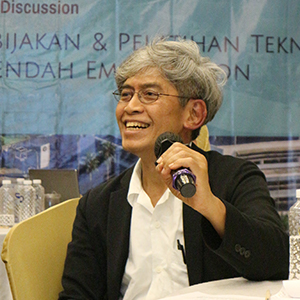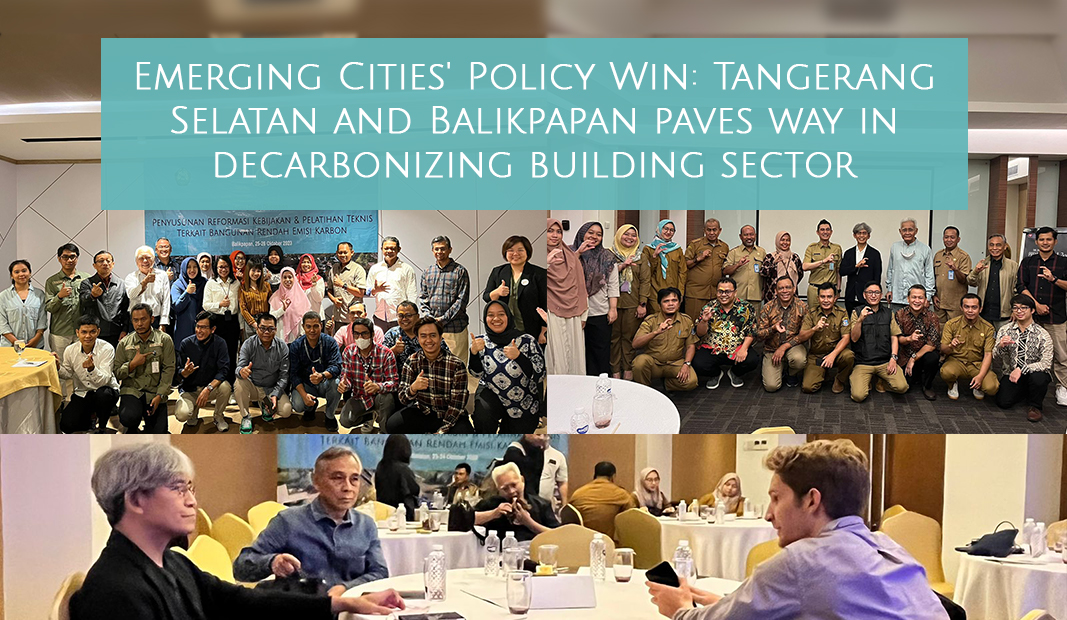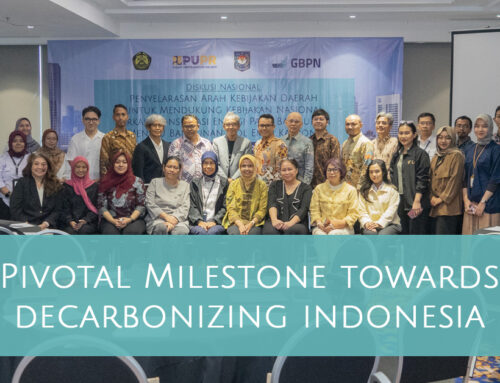Tangerang Selatan and Balikpapan, two Indonesian cities at the forefront of sustainable development, have made history by advancing to the final plenary discussion for their action plan towards zero-emissions buildings policy. With support from the Climate Works Foundation and Ministry of Energy and Mineral Resources, the collaboration between GBPN and the city and the city Government of Tangerang Selatan and Balikpapan has paved the way for an innovative and robust strategy to reduce emissions in the building sector.
National Roadmap for the Implementation of Green Building is projected to save 37 million tCO2 by 2030 from the building sector. Tangerang Selatan City, Banten Province and Balikpapan City, East Kalimantan Province are expected to achieve 3%-5% emissions reductions from government and residential buildings that contribute towards the national target in 2030.
Collaborative visions in emerging cities

Starting since last year, the collaborative effort from local government, private sectors and experts through Local Advisory Group (Local HIDUP) and working group has been pivotal in guiding the cities toward well-informed, effective solutions. Balikpapan, where the government has been very ambitious with their carbon emissions tracking, Ms Nursyamsiarni from Balikpapan City Environment Department is grateful that their journey towards sustainability is accelerated in this collaboration.
“Our partnership with GBPN, Ministry of Energy & Mineral Resources, and the Climate Work Foundation has enabled us to synergize local expertise and global best practices, fostering a sustainable vision for our city’s future. This Action Plan and policy reform not only represents our commitment to environmental stewardship but also positions us as pioneers in sustainable urban development,” said Ms Nursyamsiarni.
Each city has conducted rigorous assessments of their current building stock, energy efficiency, and potential savings. This data-driven approach ensures that the action plans are tailored to address the unique challenges and opportunities present in Tangerang Selatan and Balikpapan.
 Mr. Tateng K. Djajasudarma, a Local Advisory HIDUP from Tangerang Selatan and an expert in green building architecture, highlights the pressing need for integrated regulations and hopeful that this policy reform will pave the way for the integration between energy and building sectors
Mr. Tateng K. Djajasudarma, a Local Advisory HIDUP from Tangerang Selatan and an expert in green building architecture, highlights the pressing need for integrated regulations and hopeful that this policy reform will pave the way for the integration between energy and building sectors
“To successfully implement zero emission buildings, we must bridge the gap between the energy and building sectors, especially in defining green building criteria,” said Mr. Tateng.
“People interested in green buildings often seek incentives. We must design a reward system to motivate participation and drive change.”
“Through our participation in the Local HIDUP and working group, we have charted a path towards a more sustainable and resilient city. Regional participation is vital as they will carry out ZEB implementation. Together with GBPN we must define roles and responsibilities clearly, unifying efforts to promote the adoption of sustainable building,” he said.
Achievable goals towards sustainability in subnational level
In these two cities, the journey towards sustainable building practices is proving that it’s not inaccessible or complicated. Instead, it’s an achievable goal when multiple stakeholders come together with a shared vision of a greener future. Puri Mahestyanti, GBPN Lead Project Coordinator concludes that this plenary sessions in both cities marks the monumental collaboration of multiple stakeholders effort and can be applicable in any city in Indonesia.
“This collaborative approach, involving government officials, developers, professionals, and academicians, has successfully demystified the path to sustainability, demonstrating that sustainable building solutions can be practical, effective, and within reach when the community, both local and global, joins forces with a common purpose,” Ms Mahestyanti said.
The concerted efforts of both cities and their partners have culminated in a meticulously crafted action plan and policy reform that lays out a comprehensive roadmap for transitioning to a zero emissions building sector. By harnessing the wealth of local expertise and global knowledge, these cities are poised to set a precedent for sustainable urban development in Indonesia and beyond.
As the final plenary discussion concludes in both cities, it signifies a turning point in the sustainable trajectory of Tangerang Selatan and Balikpapan, serving as an inspiration for other cities to follow suit.
Share This Story, Choose Your Platform!
Stay in touch with how we’re transforming the buildings sector
GBPN runs innovative building policy reform programs in key regions around the world that aim to tackle the climate emergency by decarbonising the buildings sector. Stay up to date with our newsletter.
Stay in touch with how we’re transforming the buildings sector
GBPN runs innovative building policy reform programs in key regions around the world that aim to tackle the climate emergency by decarbonising the buildings sector. Stay up to date with our newsletter.







